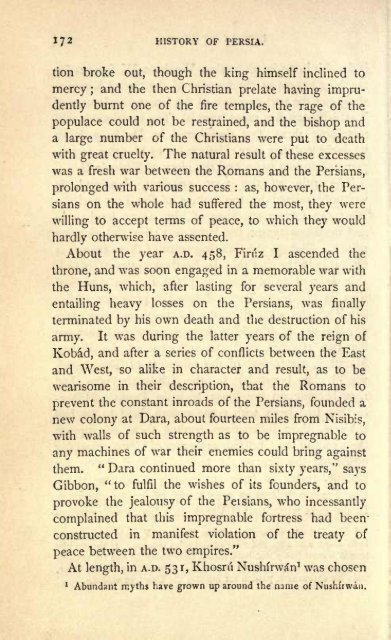Persia from the Earliest Period to the Arab
Persia from the Earliest Period to the Arab
Persia from the Earliest Period to the Arab
Create successful ePaper yourself
Turn your PDF publications into a flip-book with our unique Google optimized e-Paper software.
*7 2 HISTORY OF PERSIA.<br />
tion broke out, though <strong>the</strong> king<br />
himself inclined <strong>to</strong><br />
mercy ; and <strong>the</strong> <strong>the</strong>n Christian prelate having impru-<br />
of <strong>the</strong><br />
dently burnt one of <strong>the</strong> fire temples, <strong>the</strong> rage<br />
populace could not be restrained, and <strong>the</strong> bishop and<br />
a large number of <strong>the</strong> Christians were put <strong>to</strong> death<br />
with great cruelty. The natural result of <strong>the</strong>se excesses<br />
was a fresh war between <strong>the</strong> Romans and <strong>the</strong> <strong>Persia</strong>ns,<br />
prolonged with various success : as, however, <strong>the</strong> Per-<br />
sians on <strong>the</strong> whole had suffered <strong>the</strong> most, <strong>the</strong>y were<br />
willing <strong>to</strong> accept terms of peace, <strong>to</strong> which <strong>the</strong>y would<br />
hardly o<strong>the</strong>rwise have assented.<br />
About <strong>the</strong> year A.D. 458, Fin'iz I ascended <strong>the</strong><br />
throne, and was soon engaged in a memorable war with<br />
<strong>the</strong> Huns, which, after lasting for several years and<br />
entailing heavy losses on <strong>the</strong> <strong>Persia</strong>ns, was finally<br />
terminated by his own death and <strong>the</strong> destruction of his<br />
army. It was during <strong>the</strong> latter years of <strong>the</strong> reign of<br />
Kobad, and after a series of conflicts between <strong>the</strong> East<br />
and West, so alike in character and result, as <strong>to</strong> be<br />
wearisome in <strong>the</strong>ir description, that <strong>the</strong> Romans <strong>to</strong><br />
prevent <strong>the</strong> constant inroads of <strong>the</strong> <strong>Persia</strong>ns, founded a<br />
new colony at Dara, about fourteen miles <strong>from</strong> Nisibis,<br />
with walls of such strength as <strong>to</strong> be impregnable <strong>to</strong><br />
any machines of war <strong>the</strong>ir enemies could bring against<br />
<strong>the</strong>m.<br />
" Dara continued more than sixty years," says<br />
Gibbon, " <strong>to</strong> fulfil <strong>the</strong> wishes of its founders, and <strong>to</strong><br />
provoke <strong>the</strong> jealousy of <strong>the</strong> Peisians, who incessantly<br />
complained that this impregnable fortress had beenconstructed<br />
in manifest violation of <strong>the</strong> treaty of<br />
peace between <strong>the</strong> two empires."<br />
At length,<br />
in A.D. 531, Khosru Nushfrw^n1 was chosen<br />
1 Abundant myths have grown up around <strong>the</strong> name of Nushirwan.

















